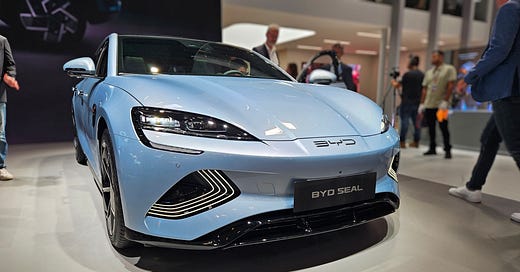European Tariffs on China’s EV Makers Could Backfire
EU wants to protect its market against increasing number of inexpensive Chinese EVs
(Updates with comments from German automobile makers)
The European Union (EU) is set to vote on Friday to back final tariffs on China’s electric vehicle (EV) makers.
The EU wants to protect its automobile makers against the increasing number of less expensive Chinese EVs entering its market. Of the total EU’s EV imports in 2023, 54% of those came from China.
But the 27-member bloc’s protectionist stance could cause a wider trade war with China. It could hurt the EU’s export-dependent companies and its EV targets and threaten critical raw material supplies.
The European Commission (EC) imposed provisional tariffs on China’s EVs in July despite Beijing’s previous warning that it would retaliate. Beijing has denied that it improperly subsidizes EV companies, arguing that its leading role in EVs results from efficient manufacturing.

Europe Automakers Warn Against Tariffs
Now, Mercedes-Benz Group AG and BMW AG are calling on Berlin to veto the tariffs to avoid a spat with their most important market.
“The EU should seek a negotiated solution with China instead of imposing tariffs,” Mercedes-Benz Chief Executive Officer Ola Källenius said in a statement Wednesday. A ‘no’ vote from the German government would be a signal of this and would help avoid a trade conflict, he added.
“Additional tariffs harm globally active companies in this country and could provoke a trade dispute from which no one gains,” BMW Chief Executive Officer Oliver Zipse said in an earlier statement Wednesday. “The German government should therefore take a clear position.”
Would tariffs actually slow China’s EV expansion into Europe? The Rhodium Group, a New York-based independent research provider, has doubts about their impact.

“Duties in the 40-50% range would probably be necessary to make the European market unattractive for Chinese EV exporters,” it said in April.
Europe-China EV Talks Stall
So far, both sides have been unable to compromise on EV trade differences.
The EU’s Commissioner for Trade, Valdis Dombrovskis, and China’s Minister of Commerce, Wang Wentao, held unsuccessful talks on September 19.
“Both sides agreed to intensify efforts to find an effective, enforceable and WTO compatible solution,” Dombrovskis said.
The EC then told EU member countries that it would continue negotiations with China after the October vote, Reuters reported.
EU members are split on whether to levy tariffs for the next five years. Spain has called on the EU to "rethink" the duties, aligning with Germany, while France supports them.
Europe’s Provisional Tariffs
The EC launched an anti-subsidy investigation against Chinese EVs last year.
The investigation concluded that China’s value chain of battery electric vehicles (BEV) benefited from unfair subsidization. This caused a “threat of economic injury to EU BEV producers,” the EC said.
The highest tariffs were imposed on Chinese state-owned automobile manufacturer SAIC Motor (Shanghai: 600104.SS) at 36.3%. BYD (OTC: BYDDY) and Volvo’s (OTC: VOLAF) parent, Geely (OTC: GELYF), received lower tariffs of 17.4% and 19.9%.
The EC then cut the tariffs marginally at the end of August. It considered submissions and technical corrections by EV companies operating in China.
Europe-China Trade Spat
In response to the threat of tariffs, China has accused the EU of violating World Trade Organization (WTO) rules.
“Judgment in the EU’s provisional conclusion lacks factual and legal foundation,” a Chinese ministry spokesperson said on August 9. “It severely violated WTO rules.”
It then brought the case to the WTO’s rules dispute settlement mechanism on August 14 to “safeguard the development rights and interests” of the EV industry.
A week later, China initiated an anti-subsidy investigation targeting EU milk, cream, and cheese products.
The EC challenged China in September at the WTO against China's investigation into EU dairy products. China’s investigation “is based on questionable allegations and insufficient evidence,” Valdis said on X.
Europe Depends on China
But a trade war with China would likely hurt European companies and its broader economy.
China imports 22% of its consumer goods from Europe. This puts luxury groups like LVMH (LVMH.PA) and Kering (PRTP.PA) at risk.
In 2023, Louis Vuitton, Dior and Gucci were some of the most successful luxury brands in China.

Tariffs could increase the cost of EVs for consumers as Europe moves to phase out new gasoline and diesel cars by 2035, according to ING.
The bloc remains highly dependent on China for critical raw materials. It sources 97% of its magnesium and 100% of its rare earths for permanent magnets from China.
“Europe will not be self-sufficient in EV production or the EV supply chain any time soon,” ING wrote on June 19. “It needs to act carefully, considering any further retaliation from China.”





